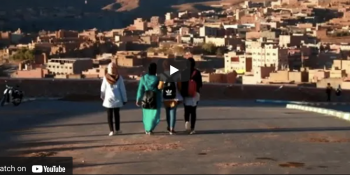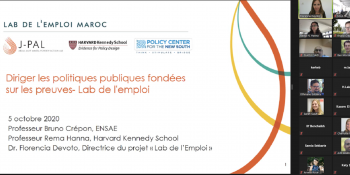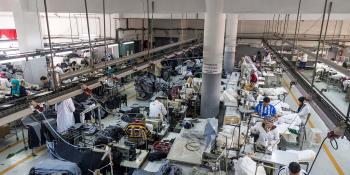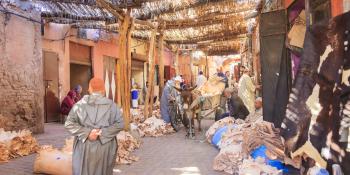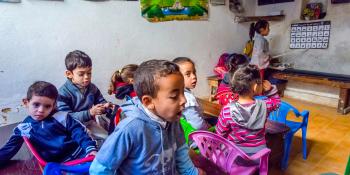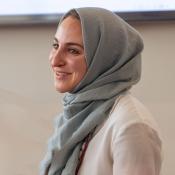Jeffrey Cheah Professor of South-East Asia Studies, Harvard Kennedy School
The Morocco Employment Lab seeks to create a culture of evidence-based policymaking through rigorous impact evaluations and capacity building in collaboration with a wide range of public and non-governmental organizations.
Evidence for Policy Design (EPoD) at Harvard Kennedy School and the Jameel Poverty Action Lab (J-PAL) at MIT are working with the Millennium Challenge Account (MCA) Morocco Agency on the Morocco Employment Lab.
Hosted at the Policy Center for the New South, the Morocco Employment Lab seeks to create a culture of evidence-based policymaking through rigorous impact evaluations and capacity building. Through this work, the Lab aims to spur innovation related to labor programs and address core employment issues in Morocco.
This research and training work will strengthen Morocco’s existing labor market programs and improve the effectiveness of future programs and policies—particularly important to support recovery from the economic downturn spurred by the COVID-19 pandemic. As such, the Employment Lab will further the mission of the "Education and Training for Employability" project under the 2017-2022 MCA-Morocco Compact II, funded by Millennium Challenge Corporation.
The Employment Lab Theory of Change
The Employment Lab works across four complementary components that contribute to building a culture of evidence-based policy and ensuring that labor market programs are informed by evidence:
-
Identify policy priorities: The Employment Lab works with policymakers to diagnose key policy challenges—especially those compounded by COVID-19—as well as identify data and highlight and prioritize knowledge gaps.
-
Build capacity for evidence use: The Employment Lab hosts training workshops and events on how to generate and use evidence in policymaking. Successive tailored trainings are delivered to researchers, civil service trainees, NGOs, and government officials at various levels to create a broad understanding of how evidence can be used in policy and program design.
-
Conduct impact evaluations: Together with its policy partners, the Employment Lab co-designs and implements a portfolio of rigorous impact evaluations using mixed-method research tools that address the identified policy priorities.
-
Share evidence to inform policy: The Employment Lab disseminates research results to a wide range of stakeholders through a large-scale policy symposium, policy briefs, and online communication channels.
Watch to learn how MEL seeks to create a culture of evidence-based policymaking with impact evaluations & capacity building.
EPoD's Morocco Employment Lab aims to promote evidence-based policymaking through training and evaluations.
The report presents an analysis of the impact of Covid-19 on the Moroccan economy, focusing on labor markets.
Led by the Morocco Employment Lab with senior officials, policymakers, & academics from key labor market institutions.
J-PAL and EPoD with the Millennium Challenge Account (MCA) are to launch the Morocco Employment Lab.
Research Projects
Researchers experimentally evaluate two interventions designed to address skills mismatch & boost productivity.
Study of Morocco’s Idmaj program, offering financial incentives for firms to hire registered jobseekers into 24-month internship positions.
Researchers prepare to identify policy responses to help workers reintegrate into the labor market as the economy starts to recover.
This project seeks to measure the impact of preschools in Morocco in the short, medium and long term.
Engaging with the Employment Lab
The Employment Lab seeks to develop a hub for labor market evidence innovation in Rabat. As such, it will work closely with a range of Moroccan actors through a diverse set of activities.
Policy decision-makers:
The Employment Lab will deliver a tailored training early on to decision-makers at key labor market institutions to lay the foundations for a common understanding of evidence-based policymaking, as well discuss priority labor policy challenges and opportunities for evaluation. Decision-makers will have the opportunity to continue engaging with the Employment Lab through seminars, where insights from global evidence and research conducted in Morocco will be shared.
Evaluation partners:
Researchers affiliated with the Employment Lab will work hand in hand with organizations implementing programs and policies that seek to improve labor market outcomes. Research will seek to answer pressing questions from evaluation partners, with a view to inform program design and effectiveness. Evaluation partners will be thoroughly trained on how to incorporate evaluation into implementation and will learn by doing as they engage with the research teams conducting impact evaluations.
Research and academic partners:
The Employment Lab will organize a series of research seminars for academics and students at Moroccan universities to discuss latest research methodologies and international perspectives on labor market issues. In addition, the Lab will collaborate with academic institutions to incorporate evidence-based policymaking into their curriculum in order to scale knowledge dissemination and ensure that knowledge is available to future decision-makers.
Academic Leads
Jeffrey Cheah Professor of South-East Asia Studies, Harvard Kennedy School







